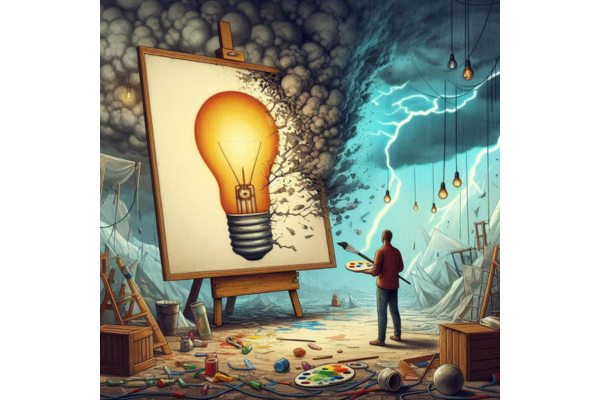Franziskus Bayer and Margit Schild
Franziskus Bayer, an expert in organisational resilience and crisis management and DKKV member, and artist/engineer Dr Margit Schild have been working together since summer 2024 on the interfaces between art and crisis, creativity and disaster. This was preceded by a DKKV lunchtalk by Margit Schild in June 2024, in which Franziskus Bayer took part as an audience member.
In view of multi-crises, a ‘world in turmoil’ (Münkler 2024), they pose the following questions: Isn’t creativity one of the most important tools of all? On the part of those affected and those helping? Especially in the face of new types of crises? A practical idea of creativity that doesn’t get lost in myths? And if this is the case, why is it so rarely mentioned in the contexts of crisis management, civil protection and disaster preparedness?
Improvisation, which is used in new, crisis-ridden and time-stressed situations, cannot cope with this alone. This is because the mixture of actions that are referred to as improvisation in these professions lies in an area that describes an interesting dilemma: On the one hand, good preparation and intensive training mean a guaranteed mastery of one’s routines and skills in time-critical moments. On the other hand, however, it can also be crucial not to apply the practised routines but – on the contrary – to refrain from doing so and to remain open to unknown developments or unforeseen events. It is possible that an event that requires an improvised response demands something completely different from what you have been practising for years. Improvisation reaches its limits and creativity is required. (cf. Schild, M. 2024)
Bayer and Schild assume that the mechanisms and framework conditions that trigger a crisis can be congruent with those that generate creativity. According to the principle: necessity is the mother of invention. In concrete terms, this means that new things are created when there is a particular need for them. The underlying mechanisms can be uncovered and named. You want to investigate the extent to which a practice can be developed from this. On the one hand, it could contribute to the development of good ideas and practicable solutions. On the other hand, it could add a refreshing perspective to the much-discussed debate on resilience.
Bayer and Schild are thus pursuing a radically interdisciplinary approach: they are bringing art and crisis management together. The aim is for practitioners and theorists from both contexts to exchange ideas and interact with each other. They have set out their ideas in a thesis paper.
In addition to publications, a toolbox and workshops with participants from the arts, civil protection and crisis management are also planned. Further information can be found at https://www.schule-des-provisorischen.de/angebot/ and on their LinkedIn profiles. Bayer and Schild’s thesis paper on the topic can also be found on both sites. Anyone interested in an event on the topic is welcome to contact Dr Margit Schild and Franziskus Bayer directly.
Franziskus Bayer: Franziskus Bayer is an expert in organisational resilience management and crisis management and contributes to related discourses in various ways. He advocates the application of the all-hazards approach and, in this context, interdisciplinary approaches to dealing with issues and situations. He works full-time as Chief Resilience Officer of an international corporation in the field of technical services.
Contact via: www.linkedin.com/in/franziskus-bayer
Dr Margit Schild: Dr Margit Schild is an artist, curator, filmmaker and graduate engineer for landscape and open space planning based in Berlin and Vancouver/Canada.
‘Necessity is the mother of invention’ is the guiding principle of her artistic practice, research and teaching, which explore the relationship between constraints and inspiration, limitations and idea development.
www.schule-des-provisorischen.de
All rights to content are held by Margit Schild and Franziskus Bayer and are subject to Copyright 2024 ©.
Please note: This comparison of similarities does not explicitly relativise the effects of crises and disasters on people and societies.
Literature used:
Münkler, H., (2023). Welt in Aufruhr. Die Ordnung der Mächte im 21. Jahrhundert. Rowohlt.
Schild, M., (2024): Is Necessity the Mother of Invention? Improvisational Action, Creativity and Art in Times of Crisis (or Crisis of Time), in: Budde, J., Wischmann, A., Rißler, G., Meier-Sternberg, M.: Novelty, Innovation and Transformation in Educational Ethnographic Research – European Perspectives, New York, Routledge


